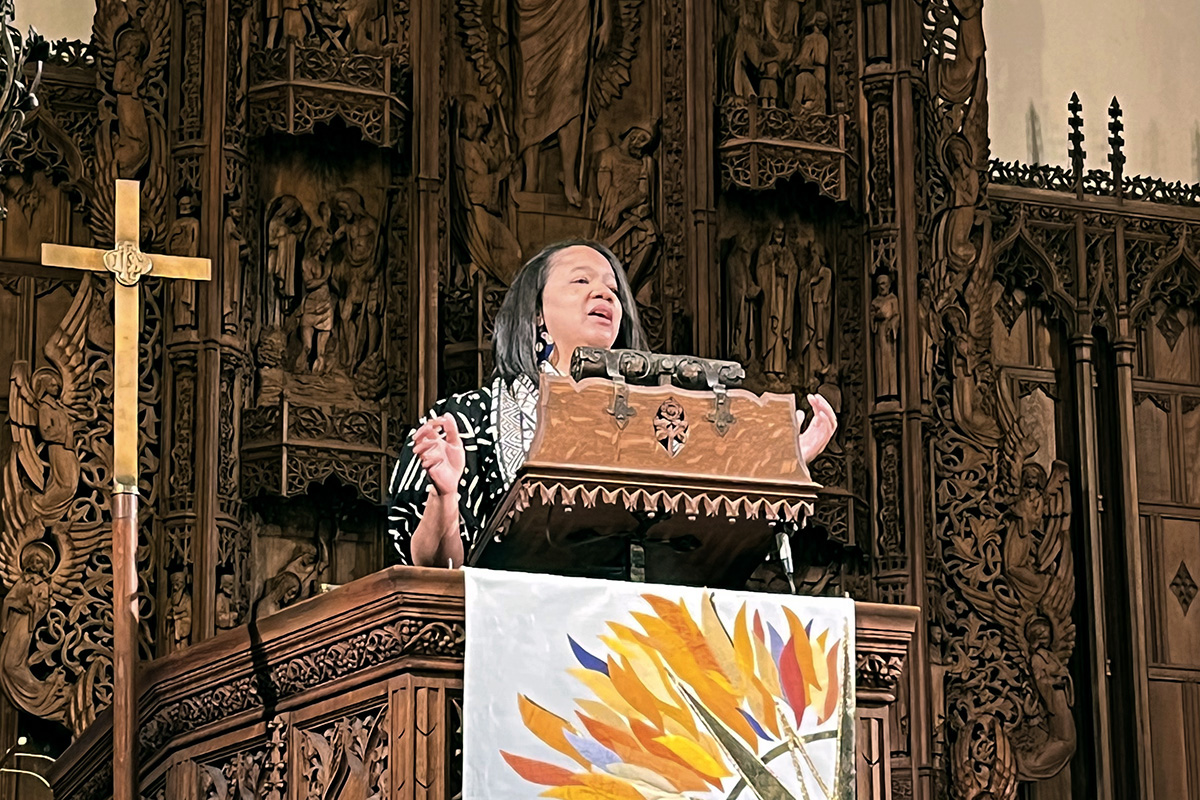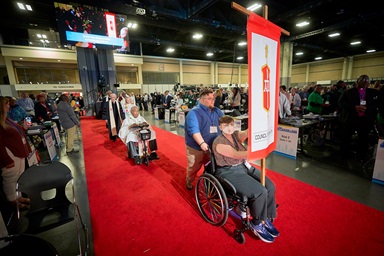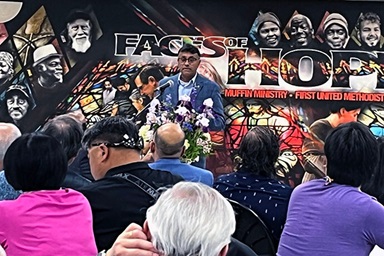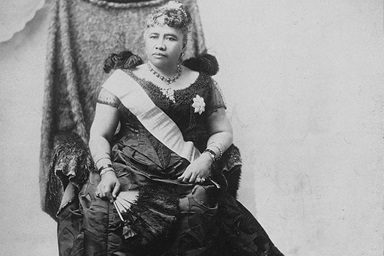Key points:
- Members of a United Methodist church in Evanston, Illinois, have donated $50,000 to a fund to be used for reparations for Black citizens who are descended from people who were enslaved.
- The Rev. Grace Imathiu, who is Black, and Matt Johnson, a white lay leader, led the effort at the church.
- The first $10 million collected from a tax on cannabis sales in the Chicago suburb is earmarked for the reparations fund.
The late Rev. Ernest Fremont Tittle, a white pastor who died in 1949, would be proud of his church in 2022, believes his successor, a Black woman.
First United Methodist Church of Evanston, Illinois, has donated $50,000 to a fund set up to pay reparations to the Black community there. The church, started in 1854 by the founders of this city 20 miles north of Chicago, has a primarily white congregation. Blacks there are still suffering from the effects of redlining that barred them from living in some communities.
“I pastor this congregation that is 97% white,” said the Rev. Grace Imathiu, a native of Kenya. “When we talk about reparations, it is not something new. It’s something that Dr. Tittle started.”
That’s not true literally, but Tittle, who pastored the church from 1919 to 1949, was a progressive on race issues ahead of his time. Here’s an example from a sermon he preached in 1944:
“We must speed up our efforts to do justice to our fellow citizens of the Negro race, who rightly contend that the question of social equality, in particular the question, ‘Do you want your daughter to marry a Negro?’ has nothing to do with the question of decent housing, of fair employment practices, of educational opportunity, or personal security against lynching and against outrageous abuse of police power.”
The city of Evanston has earmarked the first $10 million of sales tax from cannabis sales to fund reparations for its Black community, said community activist Robin Rue Simmons, a former alderman who helped pass the legislation, believed to be the first of its kind. The first $400,000 is earmarked for grants to descendants of slaves to get $25,000 to spend on housing. Sixteen out of 122 applicants selected randomly were awarded the grant on Jan. 13.
Further grants, possibly some focused on education, are planned with the money from the cannabis fund, the church and other donors.
“(First United Methodist Church of Evanston) is leading by example,” Simmons said. “It is the white community who historically harmed the Black community, and it is the white community that has enjoyed privilege and access that the Black community has not. And so the white community has a responsibility and a role as an ally leader in the movement for reparations, and this church is modeling that with this important step.”
The idea to raise money at First United Church began with discussions between Imathiu and lay leader Matt Johnson, who is white.
“I said the only way I'm going to join the stewardship committee is if we can have an emphasis on reparations, or start talking about that and raising a little money around that,” Johnson said.
Subscribe to our
e-newsletter
Imathiu said she thought it was important that a white man is a catalyst of reparations in her church.
“Matt is a lay person and Matt is steeped in United Methodism,” she said.
There has been dissent against the program in Evanston.
Dahleen Glanton, in a 2021 column published in the Chicago Tribune, said the program “is mostly a symbolic gesture with little of the substance the reparations movement hoped for.”
Besides the 16 lottery winners, African Americans won’t get anything at all for now, she said. And even the winners won’t be getting money to use any way they choose, she pointed out. The money is earmarked for use to purchase or remodel a home or pay down a mortgage.
“It will have little, if any, impact on the lives of the other approximately 12,000 Black Evanston residents,” Glanton wrote. “It probably won’t even make a dent in addressing the economic disparities resulting from decades of neglect.”
There are plans to raise at least $10 million and it hasn’t yet been decided specifically how the remaining money will be spent.
The program so far is a repackaging as reparations of measures the city should already be doing to help disadvantaged residents, Glanton said.
Johnson said that even though there is a viewpoint that this effort isn’t “truly” reparations, he considers it a start.
“I feel the federal government isn't doing anything,” he said. “There's been a bill sitting around for a long time to address reparations, but nothing has happened. I feel there needs to be a groundswell elsewhere in order to push this forward in some way, and that's why I was excited about what the city of Evanston is doing.”
There are signs the movement is spreading, Simmons said.
“I've lost count of the amount of cities that I've heard from personally over the last three years,” she said.
A December symposium in partnership with the National African American Reparations Committee drew 60 leaders, including representatives from 25 cities such as San Francisco, Detroit and Amherst, Massachusetts.
“We gave them a bus tour of (Evanston), detailing our historic segregation and showing where today in 2022 we remain racially segregated,” Simmons said. In April, the group is set to reconvene in Washington to continue talks.
For First United Methodist Church, contributing to reparations “is not a big deal,” Imathiu said.
“This is who we are,” she said. “This is part of our DNA.”
Sometimes she thinks of herself, the Black pastor of a majority white congregation, as “Dr. Tittle’s prophecy, in flesh and blood,” Imathiu said.
“I wonder then, who am I dreaming for?” she said. “If they looked at my sermons 100 years from now, what should I have been dreaming and who should I have been dreaming about?”
Patterson is a UM News reporter in Nashville, Tennessee. Contact him at 615-742-5470 or newsdesk@umcom.org. To read more United Methodist news, subscribe to the free Daily or Weekly Digests.
Like what you're reading? Support the ministry of UM News! Your support ensures the latest denominational news, dynamic stories and informative articles will continue to connect our global community. Make a tax-deductible donation at ResourceUMC.org/GiveUMCom.




